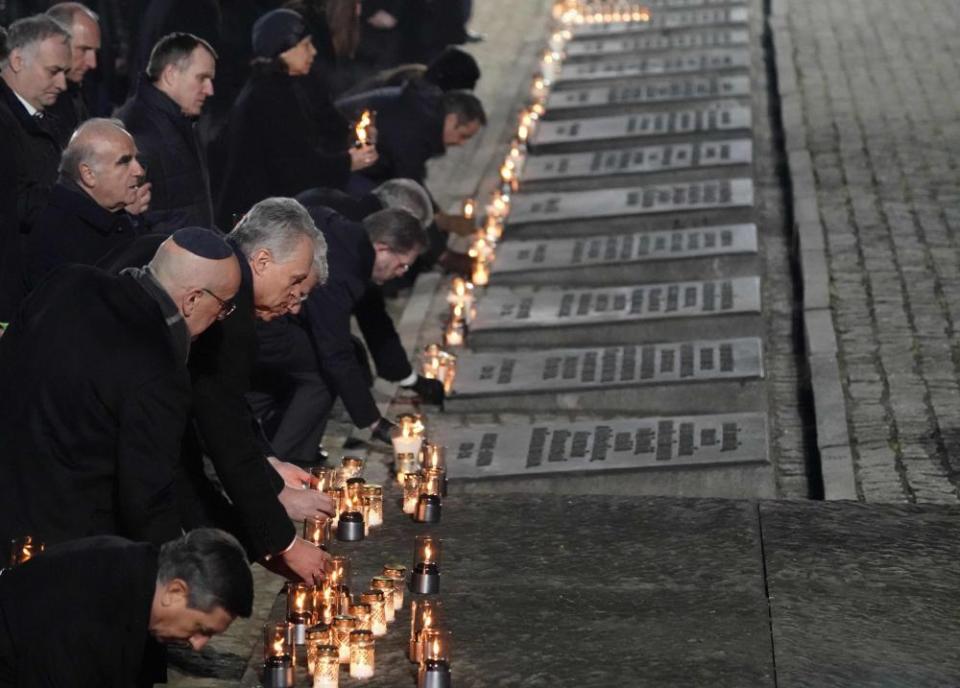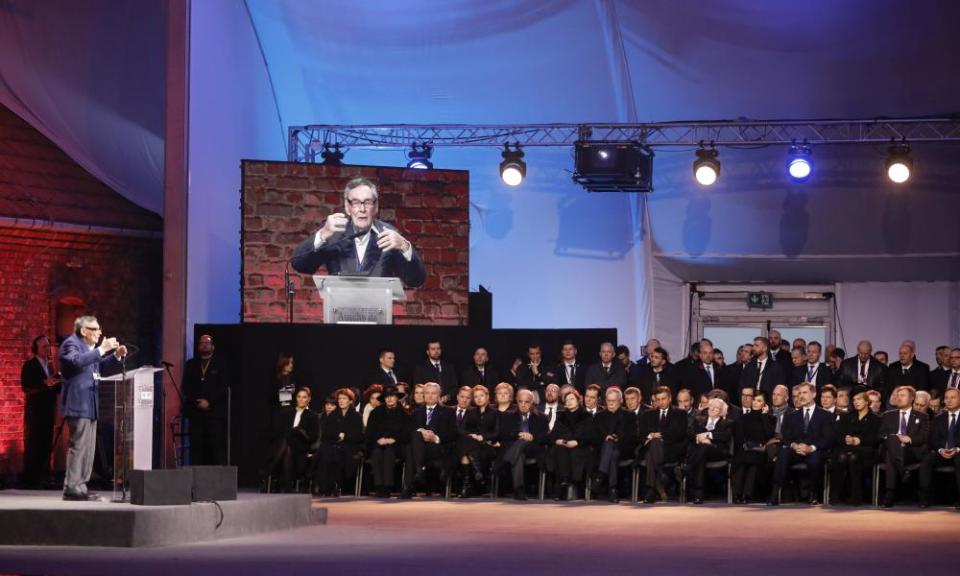Survivors call for end to world indifference at Auschwitz memorial
Survivors of Auschwitz, the Nazi death camp, have warned the world against indifference to hatred, at a ceremony to mark the 75th anniversary of its liberation by the Soviet army.
More than 200 survivors of the camp were among more than 3,000 who gathered in a huge purpose-built tent enveloping the notorious “Gate of Death” where prisoners were brought into the camp in southern Poland by cattle car, selected into lines of those who would live and die, and where most were murdered almost immediately in gas chambers.
The focus of the commemoration – attended by dignitaries from around the world, including royalty, presidents and ambassadors – was on the survivors, most in their late 80s to mid-90s, who talked movingly of their own tales of endurance and hope, of the despair of losing loved ones, as well as their sense of incredulity still to this day at the efficiency of the Nazi state-sanctioned killing machine, to which the rest of the world appeared largely indifferent and that murdered approximately 1.1 million mostly Jews in Auschwitz alone.
Related: 'I see it as a chance to finally say goodbye': Auschwitz survivors tell their stories
A total of 6 million Jews were slaughtered, 1.5 million of them children, in the Holocaust – of which Auschwitz has become the dominant and enduring symbol.
Marian Turski, who was deported to Auschwitz at the age of 18 because he was Jewish, urged the world to adopt an 11th commandment: “Thou shalt not be indifferent,” a reference to the late Nobel writer and Auschwitz survivor Elie Wiesel, who wrote: “The opposite of love is not hate, it’s indifference.”
Born in the Polish city of Łódź in 1926, Turski said he was addressing his own children and grandchildren as well as the dignitaries and the audience of millions who tuned in to a livestream of the ceremony.
He said: “Do not be indifferent when you see … historical lies … when you see that the past is stretched to fit the current political needs … do not be indifferent, otherwise you should not be surprised when another Auschwitz crashes down on us.”
Survivors wrapped in winter coats, some wearing striped uniforms similar to those they had been forced to wear at the camp, nodded and applauded. Some sat with their eyes closed, others held their heads in their hands. Thanking the survivors who had travelled from around the world along with relatives, Andrzej Duda, the president of Poland and the only high-level leader to speak, said Auschwitz had been a “monstrous, criminal nightmare”. He said the “industrial nature of the crime perpetrated here was horrifying”.

Bat-Sheva Dagan, a Polish-Israeli Auschwitz survivor, born in Łódź in 1925, said she had asked herself what had been more painful: the tattooed number on her arm, as every prisoner not sent immediately to their death received; or the loss of her hair after it was shaved off on arrival.
She said: “There’s no word in the dictionary to describe how human dignity was trampled on. The tattoo on my arm is just as visible today as it was back then … and this crown of mine was taken away … and I was turned into a pitiful creature.” Dagan said she was even more devastated when she was told that the hair was to be used to stuff mattresses.
She had survived, she said, having worked in the section of the camp where the suitcases of newcomers from Hungary were brought, and ate the food she found in them. Friendship had also kept her going.
Elza Baker who arrived as an eight-year-old with Sinti and Roma prisoners from Hamburg, after her mother was identified by the Nazi authorities as Sinti, said: “Not many people know about our suffering.” About 90% of the estimated 23,000 Sinti and Roma people who arrived at Auschwitz were murdered, she said, out of a total of between 500,000 to 1.5 million in the entire second world war.
Baker, who later settled in the UK, recalled watching a large area burning and bodies being thrown into a pit. “I remember as an eight-year-old thinking to myself: they must have run out of gas, and now they are burning people alive,” she said.
Baker, who is blind, said that at a time of rising hate crimes and anti-Jewish sentiment, “when minorities have to feel vulnerable again, I can only hope that everyone would stand up for democracy and human rights”.

Hundreds unable to attend the main event spilled into an extra viewing space erected beyond the main tent, as well as into a museum and community centre in Kraków’s Jewish quarter, Kazimierz.
Before the ceremony, returning through the entry gate, which bears the Nazi slogan Arbeit Macht Frei (work sets you free), David Marks, who lost 35 members of his family in Auschwitz when they were rounded up and deported from their home town of Șimleu Silvaniei, Romania said: “We would like the next generations to know what we went through so that it will never happen again.”
“And it could happen again,” said the 91-year-old who had travelled with his fiancee from his home in Connecticut. “There are signs to look out for. If you don’t watch out one day you wake up and it’s too late.”
Tova Friedman from Tomaszow Mazowiecki in Poland, who was five when she was incarcerated in Auschwitz and now lives in New Jersey, said: “I am the youngest survivor of just four children who returned from my village out of 5,000 children who were deported. I feel that I represent all the children that are not here, many of whom I remember. I remember when they were sent into the ovens. I represent all the possibilities that were lost – all the lives and hopes, all the writers, doctors, the scientists.”
Hirsz Litmanowicz, who was deported from a village in Poland as a child and had travelled to Poland from his home in Lima, Peru for the ceremony, said: “I was less than 12 years old when I arrived here. We were a group of 11 children, chosen by Dr [Josef] Mengele and another doctor who was experimenting on the effects of hepatitis B and infected us with it. We didn’t know why we were chosen by him but we spent three months here in Auschwitz. We were always asking: ‘Why are we here?’ But no one told us why or what was going to happen to us.”
Rabbi Naftali Schiff, director and founder of the British organisation Jroots, which partnered with the Auschwitz-Birkenau Memorial Foundation to bring many of the survivors back, said: “We are marking one of the worst periods in Jewish history. There is a genuine deep feeling of life, positivity and decency that somehow conquers all, mixed so deeply with the tears and the loss of loved ones.

“I am looking into the eyes of octogenarians and nonagenarians and there’s pride mixed with sorrow, hope with frustration. But above all there is an enormous energy and sense of ‘we shall continue to rebuild and be inspired by these incredible survivors to work together to build a better world.’”
At a dinner held on Sunday night to celebrate the revival of Jewish communities around the world, Michael Bornstein, who was four when he was liberated from Auschwitz, said he frequently heard the claim that there might not be an 80th anniversary event, because of the advanced age of so many survivors.
He said: “You know what I say? Never underestimate a survivor of the Auschwitz death camp,” he said. “See you at the 80th.”

 Yahoo News
Yahoo News 
